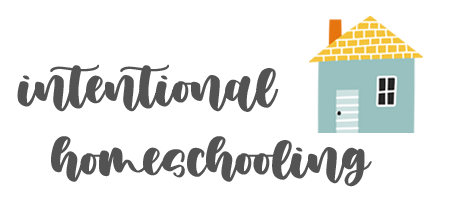A Summary of 5 Homeschooling Methods
If are around homeschoolers long enough you’ll start hearing terms like classical education, Charlotte Mason and unschooling thrown around and if you are new to the idea of homeschooling all these different methods and what they mean can get confusing.
I wanted to take what I see to be the 5 most popular homeschooling methods and break them down to give a quick view of the main points to hopefully help steer you in the direction you feel best fit for your family. Once you have an idea of which ones would (or wouldn’t) work for your family it’s easier to do some deeper research and find if it’s truly the method for your family.

A BRIEF SUMMARY OF FIVE
HOMESCHOOLING METHODS
CLASSICAL
A primarily language based method which is literature heavy and makes a point to find links between all the subjects. Such as history and literature, math and science, etc. A classical education also relies heavily on memorization (history dates and more). When I think of classical education I think of the schools depicted in Little House on the Prairie.
MY FAVORITE BOOKS ON THIS METHOD
The Core: teach your child the foundations of classical education by Leigh A. Bortins
The Well-Trained Mind by Susan Wise Bauer

CHARLOTTE MASON
Charlotte Mason was born in 1842 and was a teacher in England. She strongly believed that children were eager (and able) to learn. She focused on real life situations, handiwork (as opposed to crafts) and living books over text books or “twaddle” (the junk food of literature). She thought children should be able to finish their lessons in the morning and have the afternoons free to explore nature and read good books.
MY FAVORITE BOOK & WEBSITE ON THIS METHOD
A Charlotte Mason Companion by Karen Andreola
Ambleside Online – which is pretty much a free curriculum online
UNIT STUDIES
Unit studies often used in school and many homeschoolers like to use them as well. Unit studies always remind me of elementary school, we would use a theme like “oceans” and that theme would be incorporated into all the subjects, we’d be adding up seahorses in math, read books about underwater sea creatures in language arts, learning about habitats in science, create an underwater collage in art, etc.
If unit studies interest you, Pinterest will be your best friend, there are so many ideas there.

UNSCHOOLING
Unschooling is often described as “child-led learning” and it is exactly that, digging deeper into the topics that the kids are interested in and using your every moments as learning and teaching experiences. This doesn’t mean that you always leave schooling up to the child though, as a parent and educator, it’s your job to seek out areas of interest to your children and fill their lives with different experiences. Unschooling also focuses on learning through real life experiences such as play, household responsibilities, travel, and work experience or internships in areas they are interested in.
MY FAVORITE BOOK ON THIS METHOD
An Unschooling Manifesto: how one family found the freedom to live their dreams by Marla Taviano
ECLECTIC
Eclectic is truly how it sounds, a mash of a number of different methods, taking bit and pieces here and there that work for your family. Those that use more of an eclectic approach will often use parts of a variety of different curriculum (instead of teaching every subject from one curriculum) or will create their own curriculum to create something that works for their individual family.

When I first started to dream about homeschooling I flopped a lot between Charlotte Mason’s method and classical education. I found myself loving certain aspects of each. I knew unit studies weren’t for me because they seemed to involve a lot more planning than I really cared to do. And I really didn’t know much about unschooling until I read An Unschooling Manifesto, despite the fact that I have friends that do it. But as soon as I read that book I was drawn in. The OCD/teacher side of me still wanted a bit of a plan but I knew I also wanted more unschooling in our days than I realized.
So, for our homeschool I am choosing to go for an eclectic approach. We are following The Well-Trained Mind’s suggestions for science (in a bit of an unschooled way), using Ambleside Online’s plan for Bible reading and reading many of their free reading suggestions, math will be more unschooling (well, as much as you can unschool math with a girl who loves workbooks), and history will be literature heavy but we’ll definitely stay longer on the subjects that interest us. The rest I’ve developed a little bit of a plan for but it revolves around reading lots of books and researching subjects and topics as we have questions.
In the upcoming months I’d like to dive a little deeper into the different homeschooling methods but I thought this would serve as a good introduction for many who are at the start of this homeschooling journey.
I’d love to hear what type of homeschooling draws you in,
what do you think would or does work best for your family?









I checked out “The Well-Trained Mind” from our local library, and I think I would like to purchase a copy for myself. Do you know if there is new/expanded information in the new edition? Is it worth it to buy a new edition copy, or should I just go with an older edition?
From what I have heard there are some more detailed sample schedules in the new one coming out in August . . . oh, I just found a post where the author explains the what’s new: http://www.susanwisebauer.com/blog/publicity/the-4th-edition-of-the-well-trained-mind-whats-new/
I am actually tempted to purchase the new fourth edition even though I have the third edition.
Ohhh, thanks for that link! That helps a ton.